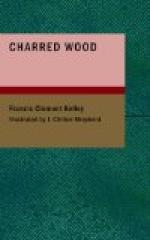“What—what is it?” he asked.
“Wreck—there was a collision,” answered Saunders.
Father Murray struggled to arise. “Collision? Then I must go forward, if it is forward—where the people are—maybe dying.”
Mark made no attempt to stop him. He knew it would be useless, and he knew, too, that it was only the Soldier of the Cross called to his battlefield. When Saunders would have remonstrated Mark motioned him to silence.
“Let him go, Saunders,” he said. “Perhaps his whole life has been a preparation for this. I have given up trying to interfere with God’s ways.”
So the Padre went, and his friends with him. The dead and wounded were being borne from the two wrecked Pullmans, but the Padre seemed led by some instinct to go on to where the engine was buried in the torn and splintered freight cars of the other train.
“The engineer and the fireman! Where are they?” he asked of the frightened conductor.
The man pointed to the heap of splinters. “In there,” he answered.
The priest tore at the pile, but could make no impression on it.
“My God!” he cried to Mark; “they may need me. And I cannot get to them.”
A groan beneath his very hands was the answer. The priest and Mark tore away enough of the splinters to see the face beneath. The eyes opened and, seeing the priest, the man essayed to speak; the priest bent low to catch the words.
“Father—don’t—risk—trying—to get me—out—before you hear—my confession.”
“But the flames are breaking out. You’ll be caught,” remonstrated Mark. “You have a chance if we act quickly.”
“The only—chance—I want—is my—confession. Quick—Father.”
With his head held close to that of the dying man, the priest listened. The men stood back and saw the smoke and flames arise out of the pile of splintered timbers. Then the priest’s hand was raised in absolution.
“Quick now!” called Father Murray; “get him out.”
The men stooped to obey, but saw that it was no use. The blood-spattered face was calm, and around the stiller lips there lingered a smile, as though the man had gone out in peace and unexpected contentment.
Turning aside, they found the fireman, and one man from the wrecked freight, lying beside the tracks—both dead. Then they went to the lengthening line along the fence. The priest bent over each recumbent form. At some he just glanced, and passed on, for they were dead. For others he had only a few words, and an encouraging prayer. But sometimes he stopped, and bent his head to listen, then lifted his hand in absolution; and Mark knew he was shriving another poor soul.
Suddenly the same thought seemed to come to both Mark and Saunders. Quickly passing along the line of pain and death, they both looked for the same face. It was not there. Yet she had been in the wrecked coach. The light of a relief train was showing far down the straight track, as Mark turned to a brakeman.




